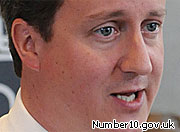The Prime Minister should “step in” to prevent children being overwhelmed by TV adverts that “normalise and glamorise” gambling, a columnist has said.
Writing in The Times, Rachel Sylvester criticised the coverage of this year’s World Cup, saying that children “could not avoid being bombarded by a campaign to encourage them to take a punt on the outcome of every match”.
She highlighted Ofcom findings, which show that four to fifteen-year-olds are exposed to an average of 211 gambling adverts a year each.
Liberalised
And she noted a 600 per cent increase in TV gambling adverts since Labour liberalised the law in 2007, allowing sports betting, online casinos and poker to be promoted on television.
The Labour sports minister who introduced the liberalisation, Gerry Sutcliffe, has admitted his government got it wrong.
Sylvester referred to Sutcliffe’s statement in the Commons last November: “We did not envisage so much advertising for sports betting before the 9pm watershed”.
Pressure
The former minister said some of the adverts “almost pressure people into betting”.
Sylvester pointed to a Swedish study which showed that “28 per cent of problem gamblers said they had gambled more because of advertising”.
“Another poll of young people found that 40 per cent said they were more likely to buy a lottery ticket if they saw an advert”, she added.
Self-control
She warned “the young do not always have the wisdom or self-control to know when to stop”.
Sylvester said: “The betting industry is booming, with revenues of £6 billion after winnings were paid out in 2012-13.
“But surely it can’t be right for sports programmes watched by children to include commercials for bookies, casinos and betting apps that normalise and glamorise gambling?”
Attempts
There have been attempts in the Commons and the Lords to change the law and limit gambling adverts on TV.
But Sylvester said the Prime Minister should “step in”, commenting: “Gambling is not just a harmless leisure activity, it can be an addiction as dangerous as smoking, drinking or drugs.
“The poorest in society are the most vulnerable, especially in a recession with soaring levels of debt”.

